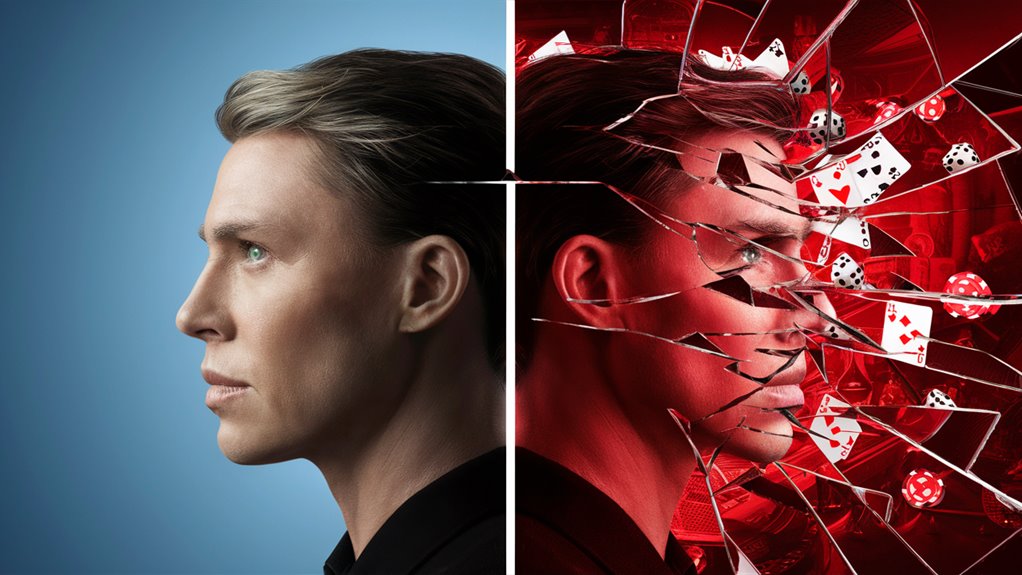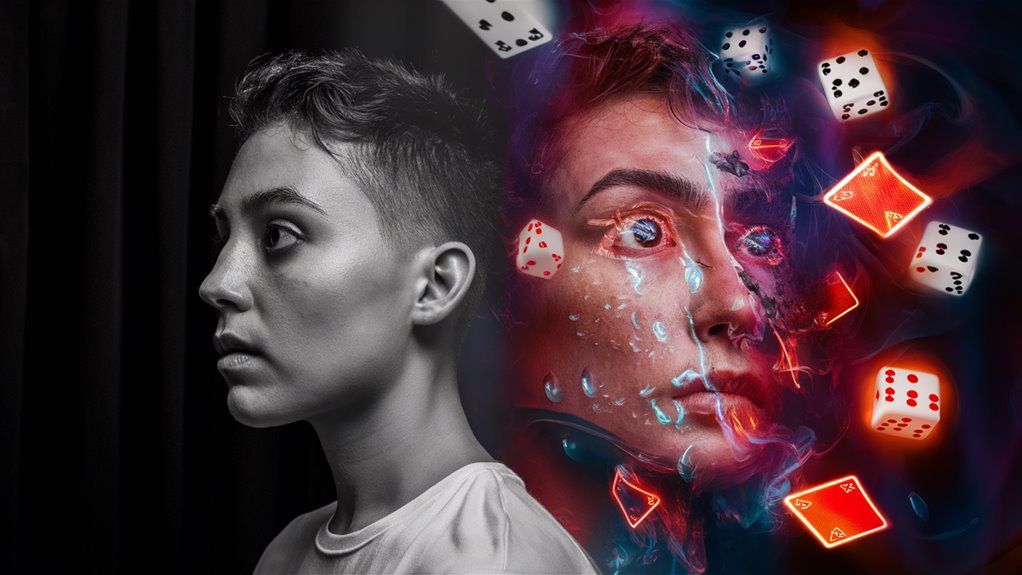How Betting Changes Your Mind and Choices

Betting addiction shifts the brain’s reward part by making strong dopamine jumps similar to what we see in drug habits. The brain changes from betting light up two key brain spots at once – the nucleus accumbens and ventral striatum – forming strong reward loops that push betting acts and risk moves.
Brain Changes from Too Much Betting
Too much betting changes the brain in big ways, notably in the prefrontal cortex, where less action weakens key risk checks and money choices. These shifts show in:
- Bigger want for rewards
- Less control on urges 신뢰할 수 있는 리뷰 보기
- Weaker boss skills
- More risk moves
Lasting Changes on Choices
The brain changes from betting last a long time in how the brain works and is built. People who bet a lot often face:
- Non-stop reward loop kicks
- Poor mind control
- Bad money choices
- Strong feel for betting hints
These changes can lead to lasting shifts in how the reward part works and boss skills, making it very hard to get better without the right help and knowing the deep brain reasons.
The Brain’s Reward Part
The Brain’s Reward Part in Betting
Brain Reasons for Betting Acts
To know how betting affects the brain’s reward part, you have to look at the complex net of brain links tied to joy and drive.
The brain lets out dopamine, a key brain chemical, making good feels and rewards during betting fun.
This brain chemical answer happens not just when you win, but also when you almost win and when you think you might win, showing why betting can hook people.
Main Brain Spots and What They Do
The nucleus accumbens, a main part of the brain’s reward loop, is very open to hints linked to betting. This spot treats both natural and made-up rewards through like paths, making betting hit hard on reward processing.
The ventral tegmental area, which makes dopamine, can get very messed up from too much betting, making you feel less from natural joys.
How It Hits Boss Choices
The prefrontal cortex, which is in charge of boss choices and judgment, shows big changes with too much betting.
This key spot’s weakness builds a loop of less urge control and messed up clear thinking, while the brain’s reward paths keep making you bet more.
Studies show that these brain changes can last, changing both how you think and how you act.
Brain Answer Ways
- Dopamine jumps during betting like those seen with drug habits
- Brain paths change from too much use
- More open reward paths boost the pull to betting hints
- Boss skills hit hurt choice skills
Dopamine and Betting Acts
The Link Between Dopamine and Betting: Knowing the Brain Science
Dopamine’s Part in Betting Acts
Dopamine, a key brain chemical in the brain’s reward part, is central to problem betting acts.
Science in the last twenty years shows that betting fun leads to big dopamine jumps, making strong good feels and rewards.
The brain’s dopamine answer kicks not just when you win, but also with almost wins and while you hope to win.
Brain Changes from Steady Betting
Long-term betting shifts the brain’s dopamine part through steady betting fun. The brain changes show in two key ways:
- Less dopamine let-out during normal fun acts
- Stronger feel to betting-linked hints
The Almost-Win Effect and Reward Paths
The brain’s way to almost-wins is a key part of betting’s brain hit. Studies show that:
- Almost-win events make dopamine jumps like real wins
- Brain’s reward path kicks at almost-wins boost betting acts
- This brain answer holds even when you lose money
Impact on Reward Handling
The changes in the dopamine part from steady betting make a strong loop of act support.
Betting hints like casino ads or slot sounds can make strong wants through kicked reward paths.
This brain setting makes standing up to betting pushes very hard, even when you fully know the bad results.
Brain Support Ways
Dopamine kicks in betting make many support layers:
- Dopamine jumps before betting
- Lasting dopamine answer during betting times
- Strong feel to betting-linked hints
- Always-on reward path kicks from almost-wins
Brain Ways During Betting
Brain Ways and Betting: Knowing the Brain’s Answer
The Brain Net Behind Betting Acts
Brain research has shown the tricky brain paths kicked during betting acts.
Brain scans show that betting starts at the same time in many spots, especially the ventral striatum, prefrontal cortex, and amygdala.
These spots make a deep net in charge of handling reward ways, choice patterns, and feels.
Reward Path Kick and Wait-and-See Answer
The nucleus accumbens, a key part of the reward path, shows more action during betting even before knowing the result. This wait-and-see neural answer drives the thrill of putting a bet.
The orbitofrontal cortex checks possible rewards and risks in real-time, while the anterior cingulate cortex keeps an eye on choice errors and conflicts.
Brain Changes in Regular Betting
Changes in Brain Chemistry
Too much betting leads to big changes in brain paths.
Problem gamblers show less action in front brain spots during betting, showing weak urge control ways.
At the same time, their amygdala and striatum are more open to betting-linked hints, making a clear brain sign that looks a lot like what we see in drug habit studies.
Impact on Choices
The brain changes seen in regular betting change:
- Risk test skills
- Reward handling ways
- Feel rules
- Act control paths
These changes make a tricky mix of mind function and habit acts, showing the deep impact of betting on brain work and shape.
Risk Check Changes
How Betting Affects Brain Risk Check

Brain Changes in Risk Handling
Regular betting really changes the brain’s risk check ways, leading to big changes in how loses and wins are seen.
These shifts change key choice acts and reward test ways, making lasting effects on act patterns.
Impact on Boss Skills
The front brain, in charge of boss choices, shows less action during risk tests after too much betting.
Brain scans show less action in brain spots that handle urge rules and risk tests. This brain shift makes you think less about potential loses while you care more about possible wins.
Dopamine Part Changes
Brain shifts in the reward part make big changes in risk views and choice patterns.
The dopamine part changes how open it is, needing more and more risky acts to feel the same kick.
This change leads to risk-not-seeing, marked by more and more risky money choices without right thought of results. These brain changes can hold past betting times, changing choices across many parts of life.
Main Risk Check Changes:
- Less seen risk
- Messed up reward system
- Weak boss skills
- Lasting choice impacts
- Always-there brain changes
Money Choices Under Betting Push
Money Choices Under Betting Push: Knowing the Impact
The Brain Science of Betting and Money Acts
Betting fun really changes money choice skills through direct hits on key brain spots.
The reward paths, especially the nucleus accumbens and front brain, go through big changes during betting times.
The jump of dopamine makes a short happy state that messes up clear money thoughts and counting skills.
Knowing Loss Chase Acts
Loss chase acts show a key shift in hurt money choices among betters.
This act pattern comes from messed up work in the ventromedial front brain, as shown by deep brain scans.
In this state, people show bad risk-reward tests, always seeing more in possible wins while they make less of losses.
Long-lasting Effects on Money Care
The hit of betting-made choice hurts lasts past just betting times.
Steady betting leads to lasting changes in brain spots in charge of urge control and money worth tests.
These brain changes lead to hurt money thoughts across different life parts, messing up everything from day buys to big cash moves.
Main Risk Parts in Money Choices
- Changed reward handling in the brain
- Messed up risk tests
- Weak urge control ways
- Always-there brain leans in money tests
- Less action in key choice-making brain spots
Breaking the Betting Cycle
Breaking the Betting Cycle: A Full Get-Better Guide
Knowing the Brain Science of Betting Get-Better
Brain change ability is key in leaving betting habits. The brain’s reward paths can be remade through aimed help and proven get-better ways.
Get-better focuses on turning hurtful habits into good acts through a step-by-step rehab way.
Proven Help Ways
Mind Habs (CBT) is a key help for betting habits. This help way helps name and change tricky thoughts and acts, switching hurtful betting habits with good reward doings that bring natural dopamine jumps.
Mind Habs and Show Help
Mind Habs makes the front brain stronger, bettering urge control and standing up to betting pushes. When mixed with show help, people can grow stronger answers to betting hints while they build good ways to cope.
Making New Brain Ways
Set Get-Better Acts
- Steady workout plans
- Social help nets
- Meaningful day acts
- Pro talk help
Medical Help Ways
Med-help talk picks like naltrexone and nalmefene can help make normal dopamine work and cut wants during the get-better journey. These meds support the brain’s fix while new act patterns set in.
Get-Better Structure
- Day plan setting
- Hint naming and handling
- Stress cut ways
- Move watching
- Backslide keep-off ways
Get-Better and Brain Fix in Problem Betting
Get-Better and Brain Fix in Problem Betting
Fast Brain Get-Better Way
Brain fix starts fast when problem betting acts stop. Through brain change ability, brain ways start reorganizing and making new links.
The first few weeks without betting show clear bettering in urge control as the front brain gets back its boss skills.
Mid-Time Get-Better Step (2-6 Months)
During months 2-6, the dopamine part goes through big rebalancing. Natural reward answers to day acts get stronger as brain links get back to normal.
Mind Habs (CBT) speeds up get-better by remaking betting-kicked brain ways.
Mind ways make get-better results better by making brain regions linked to self-rules and boss control stronger. The Future of Gambling Regulations
Long-Lasting Brain Fix
The 6-12 month get-better time usually shows less activity in betting-linked brain spots through brain pictures. The ventromedial front brain shows better work, leading to better choice skills.
While some brain changes may last, steady get-better tries bring big brain fix and mind fix. Proven help ways mixed with not doing it make lasting brain bettering.
Main Get-Better Signs
- Better urge control
- Normal dopamine work
- Better choice making
- Fixed mind work
- Less betting-linked brain activity
